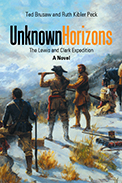
 |
At the dawn of the 19th century, on the heels of that famous bargain acquisition, the Louisiana Purchase, President Thomas Jefferson sought to explore, map, and put a stamp on America’s newly acquired land. He delegated the task to U.S. Army veterans Merriweather Lewis and his pal, William Clark, along with their assembled team of men called the Corps of Discovery. In this era well before Google Maps, the interstate highway system, and even the transcontinental railroad, the way to know and claim a land was to traverse it. In doing so, the Corps of Discovery faced a hefty stew of challenges, including native Americans, inclement weather, land and waterway obstacles, equipment and supply availability, and the human elements of sickness, conflict, and emotion. Still, they prevailed for a successful and groundbreaking mission.
Writing history into a readable framework is a challenge, as the interests of detail and accuracy compete with the need for compelling characters and a solid through line. This story succeeds on many of these levels, and it does so in several ways. Certainly, the book weaves an effective overview of the journey and its route while painting a rich and scenic portrait of the expedition’s place and time. While the characterization is spare, the personalities of Lewis and Clark do emerge, as do traits from key men on their team and from their famed native American interpreter, Sacagawea. Implied but absent from the story, and understandably out of scope, is the tremendous historical impact of this mission on the future of America. The most effective and distinctive component of the book, however, is its day-to-day depictions of life on the trail—of men and logistics, upsets and victories, work and play, duty and weariness. These small, essential nuances flesh out the story in vivid and tangible light.
RECOMMENDED by the US Review